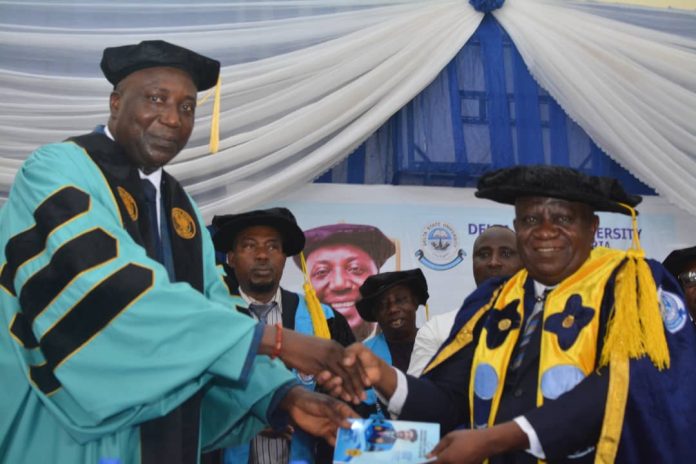By Ifeanyi Uwagwu
The Delta State Commissioner for Higher Education, Professor Nyerhovwo Tonukari has emphasised the urgent need to translate laboratory research into tangible products that will benefit society and drive economic growth.
Delivering his inaugural lecture at Delta State University (DELSU), Abraka, yesterday, the 111st lecture in the inaugural series, titled “Biotechnology: From the Laboratory to the Factory”, he lamented the disconnect between academic research and industrial application, stressing that scientific discoveries in Nigeria remained largely confined to academic publications with little real-world impact.
Tonukari, a strong advocate for biotechnology, highlighted that while Nigerian universities continue to expand their research frontiers, there was little to show in terms of commercialised outcomes. He challenged scientists to rethink their approach to research, urging them to prioritise innovation that leads to the local production of essential goods and reduces dependence on imports.
He expressed concern over the fact that Nigeria, despite having a strong base of researchers, continued to rely on foreign companies for industrial alcohol, enzymes, vitamins, and other essential biochemical products.
Using the global industrial alcohol market as an example, he noted that it was valued at over $200 billion this year, yet Nigeria contributed almost nothing to this thriving sector, instead importing most of its industrial alcohol.
Addressing the state of research funding in Nigeria, Tonukari described it as abysmal, stating that only a fraction of TETFund’s budget is allocated to research, with the majority going towards infrastructure and training.
However, he commended the Delta State Government for its commitment to funding research at DELSU through annual grants and called for more funding partnerships with private sector organisations. He argued that universities must actively collaborate with industries to secure research funding, as significant financial support will only come when research is tied to economic development.
Beyond funding, Tonukari challenged Nigerian researchers to move beyond the pursuit of academic recognition and focus on innovation that translates into practical solutions. He criticised the over-reliance on government intervention and urged scientists to take the initiative in developing products and services that will contribute to job creation and economic sustainability. He further recommended that rather than awarding small individual research grants, substantial funding—up to ₦1 billion—should be allocated to research teams drawn from multiple universities and disciplines to tackle pressing national challenges and develop innovative products.
Drawing comparisons with economies like the United States and China, the Commissioner pointed out that their research ecosystems thrived because they have industries that worked closely with universities, enabling scientists to move seamlessly between academia and industry. He called for the establishment of research parks and business incubators near Nigerian universities, where research can be commercialised through partnerships with entrepreneurs and investors.
Concluding his lecture, Tonukari reiterated that the world is rapidly changing, and Nigerian scientists must evolve with it. He urged researchers to focus on addressing societal needs, applying their knowledge to drive local industry growth, and ensuring that laboratory findings result in viable products.
His lecture served as a wake-up call to academics, policymakers, and industry stakeholders, urging them to bridge the gap between research and industry to foster innovation and national development.


